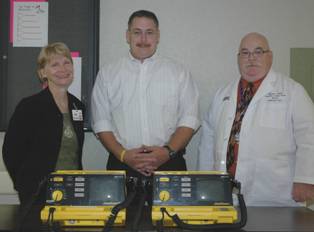Peninsula Regional Donates Defibrillators to SU RT Program
 |
| Dr. Robert Joyner Jr., director of the Respiratory Therapy Program at Salisbury University (center) accepts two defibrillators from Karen Poisker, vice president of patient care services (left) and Michael Hewitt, director of respiratory, pulmonary and neurology (right) of Peninsula Regional Medical Center. |
SALISBURY, MD---Peninsula Regional Medical Center has donated two defibrillators to the Respiratory Therapy Program at Salisbury University for instructors to use as part of the clinical education experience.
The medical devices, used to shock a patient who is suffering from specific abnormal life-threatening heart rhythms, became available for donation when Peninsula Regional recently upgraded its supply of inpatient defibrillators.
“We have always had a strong and supportive relationship with the Respiratory Therapy Program at Salisbury University and are privileged to have played a role in its significant growth over the past few years,” said Karen Poisker, vice president of patient care services at Peninsula Regional Medical Center. “Donations like these not only benefit students but ultimately our patients and the patients of other health care providers because it allows the next generation of respiratory therapists to train on the very same, life saving devices they will encounter in their clinical professions.”
Often respiratory therapy practitioners are involved in caring for patients who are suffering from cardiac arrest requiring defibrillation. For that reason, the Respiratory Therapy Program at Salisbury University requires American Heart Association Advanced Cardiac Life Support (ACLS) certification for all of its graduates.
“Teaching our students is a maturing process, meaning they develop highly technical skills that will allow them to care for the very sickest of patients,” said Dr. Robert Joyner Jr., RRT, FAARC, director of the Respiratory Therapy Program at Salisbury University. “Having these defibrillators will improve a student’s ability to practice these skills. The better trained they are before entering the workforce, the safer we all are should we ever require the specialized medical care they provide.”
The Respiratory Therapy Program in the Department of Health Sciences at Salisbury University has been in existence since 1985 and graduates an average of 20 to 24 respiratory therapy practitioners each year.
